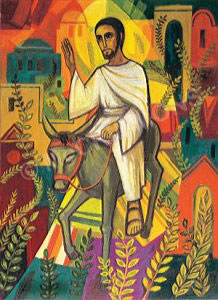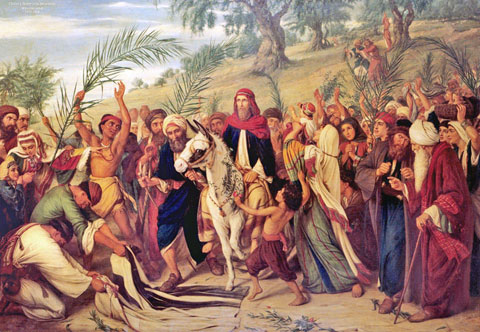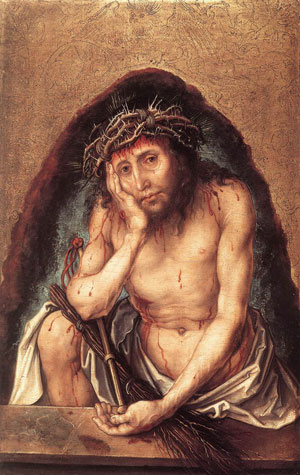
Reflection by Deborah Beach Giordano
It was the Best of Times, It was the Worst of Times
 One moment there was a parade into town: shouting and singing, waving palm fronds; the start of a big party — and then, all at once, seemingly without warning, Jesus was betrayed, arrested, tried, condemned, and crucified.
One moment there was a parade into town: shouting and singing, waving palm fronds; the start of a big party — and then, all at once, seemingly without warning, Jesus was betrayed, arrested, tried, condemned, and crucified.
It all began so innocently — or so we imagine. Of course our notion of the March of the Palms is as it is enacted by giggling Sunday School classes or hymn-singing choir members: charming, uplifting, fun. But that’s not quite how it was.
The crowds who followed Jesus into Jerusalem were strong, healthy young men and women: fieldworkers and fishermen, shepherds, storekeepers, and vineyard workers from the provinces. They were as unlike the pale, bookish sophisticates of the town — the cloistered, comfortable, and content, as chalk from cheese.
Neither was it a neat and orderly assembly; less a parade than a mob scene, accumulating idlers and troublemakers as they made their way toward the city. Noisy, excited, aimless, ready to party; heading for Jerusalem to celebrate the feast of Passover, commemorating the Exodus — when Moses led the Hebrew people to freedom, when their Egyptian oppressors were utterly destroyed.
Happy times, good memories, a glorious hope to fulfill one day… perhaps soon. Imagine no longer being enslaved by a foreign ruler — like Caesar. Imagine a heaven-sent leader — a messiah! — bringing forth a New Kingdom of the Jews! Imagine an inspired army reclaiming the holy city! Imagine..…
And chances are that the hymns this crowd was singing weren’t the Hebrew equivalent of “In the Garden,” but something closer to “The Battle Hymn of the Republic.”

No Winners
“War doesn’t determine who is right, but who is left.”
~ unknown
The Lord’s arrival set alarm bells ringing in every quarter; a rider at the head of an unruly mob surging through Jerusalem’s city gate. It could only mean one thing: trouble. Insurrections, invasions, assaults from within or without, the result was the same: people killed, wounded, disabled, driven mad; crops destroyed, lives shattered; famine, disease, and despair.
At that point Jesus could have started an uprising against the Roman occupation. It was the ideal time; appropriate historically and theologically, and he was at the head of a virtual army of sturdy, enthusiastic followers who could have been set loose to tear the town apart. Yet he did not.
Instead, the Lord “went away, going outside the city to Bethany, where he spent the night.”
~ Matthew 21:17
Jesus did not seek to build his kingdom by destroying another. Violence was not the way the of the Lord — though it was everywhere present in that time and place; the universal solution to problems and conflicts, then as now. (Even from one of His own disciples.)
When he could have brought about a revolution, Jesus turned away.
The Last Temptation?
Perhaps this was “the last Temptation of Christ.” The Lord is once again enticed to adopt the ways of the world: to achieve power by destroying the opposition; gaining control by creating chaos and confusion.
“My kingdom is not of this world,” Jesus told Pilate, according to the Johannine Gospel, perhaps resisting yet another worldly temptation: that of avoiding responsibility. When brought before Pilate, he could have lied and denied what he had done; he could have laid blame on another, perhaps accusing one of his followers of inciting the crowds. Or there was always John the Baptist to label as the guilty party: after all, the dead cannot defend themselves.
Instead, Jesus went forward, willingly, courageously. Knowing what lay ahead, he did not lose faith or succumb to fear.
No Other Way?
 But as for us, we, too, know what lies ahead — and we ask: could there have been another way to accomplish the Great Work? Wasn’t there some way that our Lord could have avoided the torment and agony of the week ahead?
But as for us, we, too, know what lies ahead — and we ask: could there have been another way to accomplish the Great Work? Wasn’t there some way that our Lord could have avoided the torment and agony of the week ahead?
We stand in awe on this day, the beginning of the terrible ascent to the hill of Golgotha; horrified witnesses to the tragedy as it unfolds. Oh my Lord, look out! Jesus, turn back! Stay with us, don’t go; your followers need You….
And yet, this beginning, and all that preceded it, and all that follows are essential parts of the Divine Plan. Jesus’ honor and goodness, His acceptance of His Father’s Will, his courage — and, most of all, His love brought forth a new understanding; a new faith, that we might come to know God’s great power and invincible compassion.
If Jesus had not retreated to Bethany, he would have been a very different sort of messiah: a worldly, militant leader who served the cause of bloodshed and destruction, consigning his followers to lives of fear and hate. Instead, our Lord continued His teachings, challenging his disciples and his opponents with parables, and — importantly — served as host at a communal dinner, offering a Lasting nourishment of which all may partake.
At Gethsemene Jesus showed us how to be when faced with difficult choices, with doubts, with fear, with suffering and pain and death: to pray, passionately, deeply, sincerely. And then to be brave and not lose faith.
Finally, without the grievous Good Friday there could be no Easter; no New Life until Jesus categorically, once and for All, died to the old. With the Cross, our Lord drove a stake through the cold, stony heart of Death. It could not hold him, it could not overcome God’s love. We have no cause for fear, no reason to tremble in the face of eternity, for all is well and all shall be well. As the apostle said, “We are more than conquerors through Christ who loved us.”
And now we wait, with patient, confident hope, for the dawning of Resurrection morning.
Come, Lord Jesus, bring Light to Your people.
Amen.
Christ’s peace be with you,
Deborah ✟
Suggested Spiritual Exercises
Pray patiently, faithfully, confidently, for the Light.
Pray the Stations of the Cross.